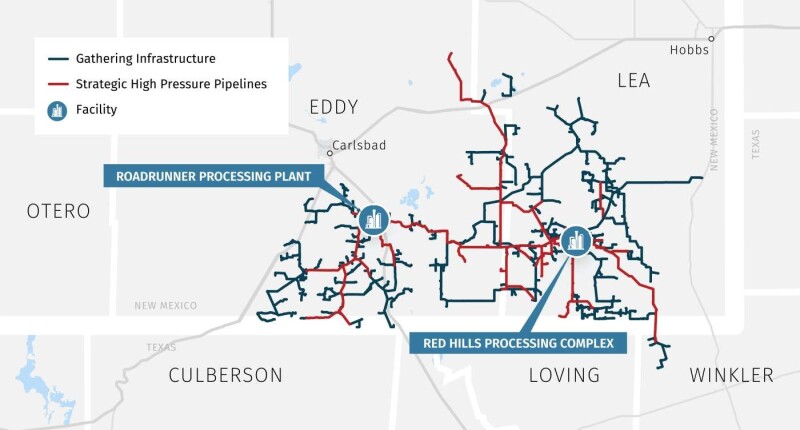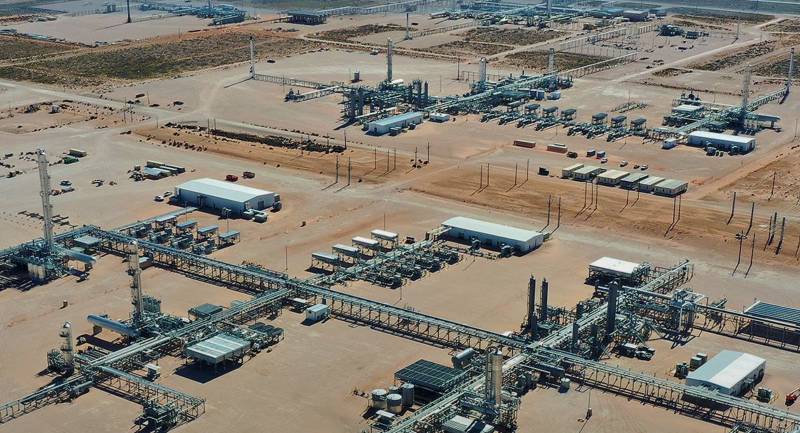Targa Resources will purchase Lucid Energy Group, a privately held natural gas processor in the Permian Basin, from investment group Riverstone Holdings and Goldman Sachs Asset Management for $3.55 billion in cash. The deal will boost the infrastructure company’s footprint in the resource-rich Delaware Basin of New Mexico.
Lucid provides natural gas gathering, treating, and processing services in the Delaware, including approximately 1,050 miles of natural gas pipelines, 160,000 of operating horsepower compression, and 1.4 Bcf/D of cryogenic natural gas processing capacity in service or under construction located primarily in Eddy and Lea counties of New Mexico.
Lucid’s network includes a pair of gas processing units—Roadrunner, just southeast of Carlsbad; and the Red Hills complex made up of six plants with combined 1.15 Bcf/D capacity (920 MMcf/D in service with 230 MMcf/D under construction), further east in Lea County. These assets complement Targa’s 26 plants with 4.7 Bcf/D of total gross natural gas processing capacity across the entire Permian.
Lucid’s assets are anchored by long-term, fixed-fee contracts and acreage dedications from a diverse set of customers including XTO and Marathon. Approximately 70% of current system volumes are sourced from investment grade producers, according to Targa.
“The strength of Targa’s standalone financial position has afforded us the flexibility to consider attractive opportunities to grow our business through acquisitions, as evidenced by our ability to finance the purchase of Lucid utilizing available cash and debt with estimated pro forma year-end 2022 leverage around 3.5 times, well within our long-term leverage ratio target range,” said Matt Meloy, chief executive of Targa. “The acquisition is expected to be immediately accretive to distributable cash flow per share. This acquisition further supports our already strong cash flow profile and ability to return an increasing amount of capital to our shareholders through common dividend increases and common share repurchases.”
Completion of the transaction is subject to customary closing conditions, including regulatory approvals. The deal is expected to close in the third quarter of 2022. Targa plans to fund the acquisition via available liquidity, including cash on hand, its existing $2.75- billion revolving credit facility, and committed debt financing.
Lucid’s Delaware footprint, acquired over the past 5 years, overlays some of the most economic crude oil and natural gas producing acreage in North America, according to Targa. Current rig activity supports more than 20 years of drilling inventory on Lucid’s greater than 600,000 dedicated acres, which are further supplemented by significant volumes subject to minimum volume commitments.

Lucid's Delaware Basin assets extend across Eddy and Lea counties in New Mexico.
The Permian rig count has been on the rise since the beginning of 2021 as COVID-19 restrictions lessened. A growing share of Permian drilling is being focused on the northern Delaware, where 90 rigs are currently operating predominately in Lea and Eddy counties. That tally represents around 55% of total Delaware activity and about 30% of total Permian activity.
In January, Lucid received approval from the US Environmental Protection Agency regarding the company’s submitted monitoring, reporting, and verification plan to sequester carbon dioxide (CO2) from its Red Hills gas processing complex in Lea County. The plan, following approval by the Internal Revenue Service, will provide section 45Q tax credits for the sequestration and permanent storage of CO2 in Lucid’s existing and permitted disposal wells. Lucid said the plan is scalable and provides growth capacity, enabling it to offer a lower-carbon-intensity service to its customers and reduced-carbon footprint to its stakeholders.


